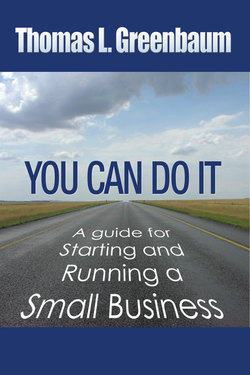Читать книгу You Can Do It - Thomas Greenbaum - Страница 10
На сайте Литреса книга снята с продажи.
ОглавлениеCHAPTER TWO - The Key Ingredient to Entrepreneurial Success - The Idea
There are two very important rules relative to entrepreneurial success. The first is to have a great idea, and the second is that if you don't have a great idea, keep working until you can identify one.
A significant number of clients come into SCORE seeking to start a business, but they have no concept of what the idea will be that can make their business a success. Some have decided to start a consulting business; others have a customer service concept and a third group wants to begin an e-commerce website. Typically the problem with each of these ideas is that they have not figured out why a customer would want to buy from them. The world does not need another ‘me too’ product or service. On the other hand a completely new idea that is revolutionary in a product category (i.e., Facebook, Evian, iPad) requires a major emotional and financial commitment in order to be successful, something most small business entrepreneurs do not have.
What then are the criteria for an idea that would suggest that it is one that is worth pursuing as a prospective new business? It is important to recognize that the criteria for a good business idea are the same whether the business is in the service sector (i.e., home care, interior design), retail business (shoe store, clothing store, e-commerce website), product category (soap, cosmetics, hair dryer) or business to business (computer consulting, marketing services, architecture). Let's look at the criteria for a good idea:
It is Unique to the Business Category - For example, it represents something that none of the other entries in the category offer at the current time. This is often referred to as the UNIQUE SELLING PROPOSITION (USP). In the ideal situation it is something that only you can say about your product or service and will be the basis for your positioning (to be covered in a later chapter). A USP can be product oriented (i.e., a longer life battery), service oriented (i.e., home care providers available within 1 hour), or emotional (you will look or feel better). The key is that it is sufficiently different from others with whom you will compete so that you will have a platform that sets you apart from the competition.
Is Meaningful to your Target Audience - A great idea is only good IF it is something that is unique as just discussed, but also represents something to which your target audience (to be covered in a later chapter) can relate as being important. For example, most people love the taste of cola drinks. Recently Coke came out with a product that had a citrus additive in the cola. This probably evolved from their research that indicated a large percentage of their users order Coke with lemon or lime. Therefore they developed a Coke with this flavor recognizing that it was something that was of interest to the target customer.
Had Coke come out with an apple flavored cola beverage it probably would not be successful. While the idea clearly is unique to the brand and the category, it most likely is not something to which the users of Coke or Pepsi could relate as being a desirable flavor.
Is Easy to Understand - A vital element in the evaluation of an idea is whether the target consumer quickly and easily understands it. For example, the addition of a citrus flavor to traditional Coke is a simple concept that any customer would understand immediately. On the other hand, if a smart phone manufacturer added a feature that would dramatically reduce the number of dropped calls or would expand the coverage of the phone, this would have to be explained in very simple terms to the consumer. Most consumers do not care how the company achieved this capability; they only want to know that it is a benefit they will get from the enhancement.
Represents a benefit, not a feature - Customers are seeking benefits and not features when evaluating ideas as prospective reasons to buy. For example, if a tool company developed a new type of drill that could withstand the heat of constant use, the customer (i.e., professional contractor, DIY home user) would be more interested in what that means for them in terms of the use of the drill. It still makes the same hole, but the benefit is probably that the drill will save time as you can work continuously without having to wait for it to cool off. Therefore the benefit of the new technology is saving of time or perhaps to a professional contractor saving money!
Another example of promoting features versus benefits would be a new plumbing service business. They could advertise their feature of having more plumbers in the town than any other company (a feature) or offer to provide 1-hour service for all emergencies (a benefit).
Advertisable / Marketable - The last criteria is that the point of difference be advertisable and marketable so that it can easily be communicated to the target customer. To accomplish this, it must be able to be communicated within only 3-5 words. If it requires more than that it probably has little valuable in terms of the communications capabilities to the target customer.
SUMMARY - Nothing is more important than the idea you have for your business. Take the time to ensure that you have fully developed your idea and then plan to do the appropriate testing to be sure it is worth your time and effort. Extra time planning and researching your idea will pay significant dividends to you as the venture unfolds, and will dramatically increase the probability that your venture succeeds.
